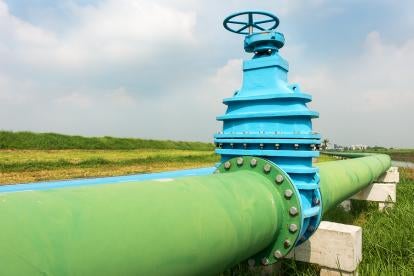Elaine Chao Confirmed as Secretary of Transportation
On January 31, the Senate confirmed Ms. Elaine Chao as the Secretary of Transportation. Secretary Chao previously served as Secretary of Labor under President George W. Bush and Deputy Secretary of Transportation under President George H.W. Bush. Ms. Chao also is the wife of Senate Majority leader Mitch McConnell.
Mike Mulvaney Confirmed as OMB Director
On February 16, the Senate confirmed Mike Mulvaney as Director of the Office of Management and Budget (OMB). OMB’s Office of Information and Regulatory Affairs (OIRA) is responsible for reviewing rules proposed by executive agencies, including the Pipeline and Hazardous Materials Safety Administration (PHMSA), before publication.
PHMSA Withdraws from Federal Register Final Rule Amending Safety Regulations for Hazardous Liquid Pipelines
We understand that PHMSA has withdrawn the final rule amending the Part 195 regulations for hazardous liquid pipelines. PHMSA had released a pre-publication copy of the final rule on January 13. PHMSA withdrew the final rule following the January 20 “Memorandum for the Heads of Executive Departments and Agencies” issued by the Assistant to the President and Chief of Staff for the White House, Reince Priebus, instructing agencies to withdraw regulations that had been sent to the Federal Register but not yet published so that they can be reviewed and approved by the new Administration. At this time, the status of the final rule has not been announced.
PHMSA Rulemakings Update. The tables below summarize the status of PHMSA’s rulemakings as reported in the Department of Transportation’s (DOT) December Significant Rulemaking Report, and by OIRA in the Fall 2016 Unified Regulatory Agenda. Due to the change in Administrations, DOT did not release a Significant Rulemaking Report for January.
Pending Final Rules
|
Proceeding |
DOT Estimated Submission to OMB* |
DOT Estimated Publication |
OIRA Estimated Publication |
|
Enhanced Emergency Order Procedures |
Not listed by DOT |
Not listed by DOT |
No estimate provided |
|
Inflation Adjustment of Maximum Civil Penalties |
Not listed by DOT |
Not listed by DOT |
February 2017 |
|
Operator Qualification, Cost Recovery, Accident and Incident Notification, and Other Pipeline Safety Proposed Changes |
Published January 23, 2017 |
||
|
Plastic Pipe Rule |
Not listed by DOT |
Not listed by DOT |
December 2016 |
|
Safety of Gas Transmission and Gathering Pipelines |
August 29, 2017 |
December 11, 2017 |
Not Listed |
|
Safety of Hazardous Liquid Pipelines |
Pre-publication copy released January 13; withdrawn from publication in the Federal Register on January 24, 2017 |
||
|
Underground Storage Facilities (interim final rule) |
Issued December 19, 2016 |
||
Pending Notices of Proposed Rulemaking
|
Proceeding |
DOT Estimated Submission to OMB* |
DOT Estimated Publication |
OIRA Estimated Publication |
|
Standards Update Rule – 2015 and Beyond (formerly the “Periodic Updates of Regulatory References to Technical Standards and Miscellaneous Amendments”) |
Not listed by DOT |
Not listed by DOT |
November 2016 |
|
State Pipeline Safety Program Certification |
Not listed by DOT |
Not listed by DOT |
November 2016 |
|
Valve Installation and Minimum Rupture Detection Standards |
January 24, 2017 |
May 3, 2017 |
May 2017 |
*Under Executive Order (EO) 12866, OMB reviews proposed significant rules to ensure they are consistent with applicable law, the President’s priorities, and the principles set forth in the EO, and to ensure the proposals do not conflict with another agency’s policies or actions. OMB also analyzes the cost-benefit analyses in support of the proposals. While the EO sets out deadlines for OMB evaluation, review periods are often extended.
UPDATES FROM OTHER FEDERAL AGENCIES
DOT proposes amendments to drug-testing regulations. On January 23, DOT published a notice of proposed rulemaking to amend its drug-testing program regulations (Part 40 of Title 49). The proposed rule would, among other things, allow federal agencies with drug-testing responsibilities to test for four additional Schedule II (of the Controlled Substances Act) prescription opioid medications and make other modifications. The proposed amendments will harmonize DOT’s drug-testing regulations with revised Mandatory Guidelines of the U.S. Department of Health and Human Services (HHS) regarding drug-testing programs for urine testing that become effective October 1, 2017. DOT and its modal agencies, such as PHMSA, are required to follow the HHS Mandatory Guidelines for the categories of drugs that require testing. Comments on DOT’s proposed rule are due March 24, 2017.
DOT Office of Inspector General includes lack of criminal prosecution of pipeline safety violations on list of DOT top management challenges for 2017. On February 8, the DOT Office of Inspector General (OIG) released a statement addressing DOT’s top management challenges. The statement reiterated previous OIG findings that, despite numerous pipeline accidents related to violations of pipeline safety regulations, successful criminal prosecutions are difficult to obtain. The OIG notes the recent conviction and sentencing of Pacific Gas & Electric Company (PG&E) for violations related to the 2010 San Bruno, California, incident, but suggests that lowering the standard for establishing criminal liability under the Pipeline Safety Act from “knowing and willful” to “reckless” would increase the number of successful criminal prosecutions and deter future pipeline incidents.
UPDATES FROM CANADA
NEB orders online posting of emergency management program information. On January 30, Canada’s National Energy Board (NEB) announced finalization of Order MO‑002‑2017 requiring that all companies authorized to construct and operate NEB-regulated oil or gas pipelines or gas processing plants make emergency management program information applicable to those facilities publicly available on company websites no later than July 31, 2017. Regulated companies must confirm to the NEB that all the required emergency management program information has been published online by August 15, 2017.
UPDATES ON LITIGATION
PG&E sentenced in criminal case for San Bruno incident. On January 26, a federal judge sentenced PG&E following its criminal convictions associated with the 2010 San Bruno incident. PG&E was ordered to pay a $3 million fine and a $2,400,000 special assessment; perform 10,000 hours of community service, 2,000 of which must be performed by high-level personnel; and advertise on television and in the newspaper, the offenses, convictions, punishment, and steps taken to prevent recurrence. PG&E also was sentenced to 5 years’ probation and required to retain an independent monitor for five years, who will help ensure that the company takes reasonable and appropriate steps to maintain the safety of its gas transmission pipeline system, performs appropriate assessment testing, and maintains an effective ethics and compliance program and safety-related incentive program.
SELECT UPDATES FROM STATES
CONNECTICUT
SB 539 (Frantz) would amend Title 16 of the state statutes regarding Public Service Companies to require that the Department of Energy and Environmental Protection study the safety of natural gas pipelines. The bill was referred to the Energy and Technology Committee.
PENNSYLVANIA
SB 242 (Baker) would amend the Pennsylvania One Call System by (1) extending the expiration of the Underground Utility Line Protection Act to the end of 2022; (2) transferring enforcement authority from the Department of Labor and Industry to the Pennsylvania Public Utility Commission; (3) removing existing excavation work exemptions for extracting natural resources, minor routine maintenance by political subdivisions, routine maintenance and removal of sediment buildup on public road right-of-ways, and Class 1 gathering pipelines; and (4) establishing a damage prevention committee with authority to assess administrative penalties for violations. The bill was referred to the Committee for Consumer Protection and Professional Licensure.
TEXAS
H.B. No. 1818 (Gonzales) would reauthorize the Texas Railroad Commission (TRC) through September 1, 2029 and require that the agency, among other things, (1) develop negotiated rulemaking and alternative dispute resolution policies; (2) develop and publish an annual plan to strategically use the TRC’s oil and gas monitoring and enforcement resources; (3) authorize the collection of fees to support pipeline safety and regulatory program costs; and (4) adopt rules to expand application of damage prevention safety standards to include interstate pipelines.
WASHINGTON
HB 1611 (Farrell) would modify regulatory programs covering the transportation of oil, including requiring railroads, vessels, and pipeline facilities located on or near state navigable waters to require certificates demonstrating the financial ability to pay for costs and damages caused by an oil spill, and requiring updates to oil refinery spill prevention and contingency plans to address the handling of crude oil for export. The bill also would expand the scope of the oil spill Administration and Response Taxes to include oil received by pipeline and require that the construction or enlargement of crude oil pipelines at least 5 miles long or having a diameter of at least 6 inches be subject to review by the Energy Facility Site Evaluation Council. The bill was referred to the House Environment Committee.





 i
i

